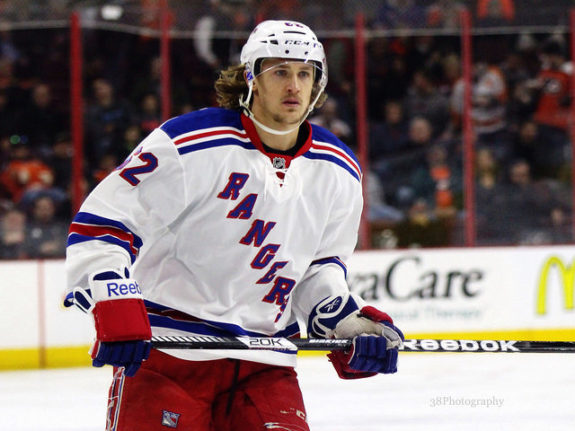Some nostalgia swept over the New York Rangers fan base Aug. 30, when winger Carl Hagelin announced his retirement after 11 NHL seasons, an eye injury he sustained in practice with the Washington Capitals on March 1, 2022, proving too much to overcome.
It’s safe to say there wasn’t a single Blueshirts fan who didn’t feel some sadness for the player affectionately nicknamed “Hags,” whose first four seasons came with the team that took a flier on him in the sixth round of the 2007 draft. Hagelin, who also underwent hip resurfacing surgery in February, hasn’t played for the Rangers since 2015, but he remains a beloved figure on Broadway.
That’s not only because fans might be waxing poetic for a recent past of Rangers who came close to a championship, only to fall short. It’s because the club has never been able to replace Hagelin’s contributions, which were pivotal to three runs to at least the Eastern Conference Final, including one push to the Stanley Cup Final. In fact, the current team, with championship aspirations of its own, is in desperate need of just what a vintage Hagelin could bring.

The 2023-24 Rangers, heavy on top-end skill but light on proven secondary contributors with winning intangibles, would be perfectly served by someone who provides speed, forechecking, some scoring, penalty killing and versatility – someone who can play on the third line but also move seamlessly up in the lineup when needed.
In short, someone like Hags, whose effect on a roster was obvious during his time in New York and was driven home by his championship arrival with the Pittsburgh Penguins shortly after leaving Madison Square Garden.
Hagelin’s Bevy of Skills Were Critical to Contending Rangers, Cup-Winning Penguins
For all that the University of Michigan grad by way of Sodertalje, Sweden, excelled at, the enduring image of the 168th overall pick in his draft class is him hounding the puck. Hagelin’s scoring prowess at Michigan, where he recorded 99 points in 89 games over his final two seasons, didn’t translate at that level to the NHL. What he did as well as anyone in the league was create havoc in the offensive zone with his relentless forechecking, thanks to his speed and instincts. He did it all over the rest of the ice as well, particularly on the penalty kill.
That led to offense, of course – he recorded 58 goals and 72 assists in 266 regular-season games in a Blueshirt – but his overall impact was simply to make the Rangers better whenever he stepped over the boards. Hagelin posted a Corsi for percentage above 50 in each of his first three seasons in New York. He delivered seven goals and five assists in 25 playoff games in 2014 as the Blueshirts reached the Cup Final, often skating in the top six on a line with Brad Richards and Martin St. Louis.

Hagelin played in a staggering 73 postseason contests in his four seasons on Broadway and totaled 12 goals and 14 assists. He delivered the series-winning goal in overtime against the Penguins in the first round of the 2015 playoffs.
But with the Rangers facing a salary-cap crunch (sound familiar?) after that season, which ended in Game 7 of the East Final, they sent Hagelin to the Anaheim Ducks on June 27, 2015. The trade was a disaster, with forward Emerson Etem and a second-round draft pick coming back to the Blueshirts in a return that ended up being essentially nothing. Even worse, Hagelin found himself in position to remind the Rangers of what they gave up less than a year later.
Dealt by the Ducks to the Pens 43 games into 2015-16, Hagelin proved to be the missing piece for a championship team. He recorded 27 points in 37 regular-season games with a plus-18 rating, then added 16 points with a plus-9 mark in 24 playoff contests as Pittsburgh won the Stanley Cup. He helped the Penguins repeat as champs in 2017, marking the fifth time in his first six seasons that he reached at least the Eastern Conference Final.
No NHL player participated in more playoff games from 2010-19 than Hagelin, with 128. That stat is all the more impressive considering that he didn’t play in the postseason until 2012.
“There was something special about the playoffs,” Hagelin said. “You knew that, even though you had a bad game in the playoffs, you knew that the next game you could be the difference-maker, and I just found that my game was taken to another level in a lot of these playoff games.”
Hagelin’s effectiveness hardly waned over his final seasons. Traded by the Los Angeles Kings to the Capitals in November 2018, he played in 187 games for Washington and posted a plus-29 rating.
The Rangers have been unable to recreate Hagelin’s impact in the years since his ill-advised departure. The speedy Michael Grabner, signed as a free agent in July 2016 in a clear attempt to rediscover what had been lost the previous summer, proved to be a reasonable facsimile. Grabner was a better offensive player than Hagelin and scored 52 goals in 135 games over a season-plus with the Blueshirts, but he still didn’t match Hagelin’s all-around game. Recent fan favorite Tyler Motte evoked echoes of Hagelin, but again, didn’t possess nearly the full set of abilities of his predecessor.
Skill-Heavy Rangers Still Lacking Hagelin’s Tools
Fast-forward to the upcoming season, with the Rangers once more looking to construct a pair of bottom-six lines with clearly-defined purposes. Rather than a badly-needed shutdown checking unit for the third line, it appears they club will be running out a third scoring trio yet again. The fourth line will be a partial mix of bargain-basement offseason additions.
It’s not at all coincidental that the Rangers’ difficulty level in shaping their bottom-six forward group has increased since moving on from Hagelin. The same can be said for Hagelin’s former sometimes-linemate Jesper Fast, whose own sound, all-around game and ease in moving effectively around the lineup was lost to free agency after the 2019-20 season.
Related: Rangers’ Prospect Brett Berard Can Turn Into a Valuable Player
The Blueshirts’ latest attempt at bringing back some of those championship intangibles came in the form of a 2021 overpayment for Barclay Goodrow, who had the same effect as Hagelin for a pair of Tampa Bay Lightning championship teams but who, at $3.6 million per season for six years, is too expensive for a bottom-six forward.

As important as elite talent is to winning Stanley Cups, players like Hagelin – glue guys found on the cheap – are perhaps just as important in the pursuit of the chalice. Plucking a piece that turned out to be critical to a championship-contending team in the sixth round of the draft represented a coup for the Rangers back in 2007. For the current Blueshirts, finding their way to the Stanley Cup Final will probably require discovering more players who can give them some of what Hagelin did.
As the past eight years have demonstrated, however, those kinds of finds can be quite elusive. That makes Hagelin calling it a career after 11 outstanding seasons all the more bittersweet for the Rangers faithful.
